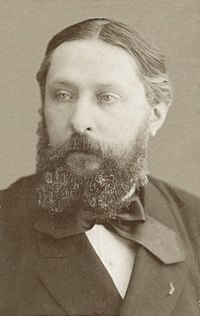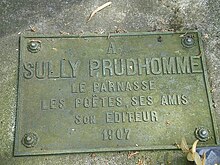Sully Prudhomme
Sully Prudhomme | |
|---|---|
 Prudhomme in the 1880s | |
| Born | René François Armand Prudhomme 16 March 1839 Paris,France |
| Died | 6 September 1907(aged 68) Châtenay-Malabry,France |
| Occupation | Writer |
| Language | French |
| Nationality | French |
| Genre | |
| Literary movement | Parnassianism |
| Notable awards | Nobel Prize in Literature 1901 |
René François Armand"Sully"Prudhomme(French:[sylipʁydɔm];16 March 1839 – 6 September 1907) was a French poet and essayist. He was the first winner of theNobel Prize in Literature in 1901.
Born in Paris, Prudhomme originally studied to be an engineer, but turned to philosophy and later to poetry; he declared it as his intention to create scientific poetry for modern times. In character sincere and melancholic, he was linked to theParnassus school,although, at the same time, his work displays characteristics of its own.
Early life[edit]
Prudhomme's parents were M. Sully Prudhomme and Clotilde Caillat. They had been engaged for 10 years before they had felt financially able to marry. When Prudhomme was two, his father, a shopkeeper, died. His mother and he relocated to Prudhomme's uncle's house. Prudhomme joined his father's name "Sully" with his surname Prudhomme, becoming Sully-Prudhomme. He was interested in classic literature and mathematics in school. He also considered entering the Dominican order, but decided against it.[1][2]
Prudhomme attended theLycée Bonaparte,but eye trouble interrupted his studies. He worked for a while in theCreusotregion for theSchneidersteelfoundry,and then began studying law in a notary's office. The favourable reception of his early poems by theConférence La Bruyère(a student society) encouraged him to begin a literary career.
Writing[edit]
His first collection,Stances et Poèmes( "Stanzas and Poems", 1865), was praised bySainte-Beuve.It included his most famous poem,Le vase brisé.He published more poetry before the outbreak of theFranco-Prussian War.This war, which he discussed inImpressions de la guerre(1872) andLa France(1874), permanently damaged his health.
During his career, Prudhomme gradually shifted from the sentimental style of his first books towards a more personal style which unified the formality of theParnassusschool with his interest in philosophical and scientific subjects. One of his inspirations was clearlyLucretius'sDe rerum natura,whose first book he translated into verse. His philosophy was expressed inLa Justice(1878) andLe Bonheur(1888). The extreme economy of means employed in these poems has, however, usually been judged as compromising their poetical quality without advancing their claims as works of philosophy. He was elected to theAcadémie françaisein 1881. Another distinction,Chevalier de laLégion d’honneur,was to follow in 1895.
AfterLe Bonheur,Prudhomme turned from poetry to write essays onaestheticsand philosophy. He published two important essays:L'Expression dans les beaux-arts(1884) andRéflexions sur l'art des vers(1892), a series of articles onBlaise PascalinLa Revue des Deux Mondes(1890), and an article onfree will(La Psychologie du Libre-Arbitre,1906) in theRevue de métaphysique et de morale.
Nobel Prize[edit]
The first writer to receive theNobel Prize for Literature(given "in special recognition of his poetic composition, which gives evidence oflofty idealism,artistic perfection and a rare combination of the qualities of both heart and intellect "), he devoted the bulk of the money he received to the creation of a poetry prize awarded by theSociété des gens de lettres.He also founded, in 1902, theSociété des poètes françaiswithJose-Maria de HerediaandLeon Dierx.
Death[edit]

At the end of his life, his poor health (which had troubled him ever since 1870) forced him to live almost as arecluseatChâtenay-Malabry,suffering attacks of paralysis while continuing to work on essays. He died suddenly on 6 September 1907, and was buried atPère-Lachaisein Paris.
Bibliography[edit]
Poetry[edit]
- 1865:Stances et poèmes
- 1866:Les épreuves
- 1868:Croquis italiens
- 1869:Les solitudes: poésies[Les écuries d’Augias]
- 1872:Les destins
- 1874:La révolte des fleurs
- 1874:La France
- 1875:Les vaines tendresses
- 1876:Le zénith,previously published inRevue des deux mondes
- 1878:La justice
- 1865–1888:Poésie
- 1886:Le prisme, poésies diverses
- 1888:Le bonheur
- 1908:Épaves
Prose[edit]
- 1883–1908:Œuvres de Sully Prudhomme(poetry and prose), 8 volumes, A. Lemerre
- 1896:Que sais-je?(philosophy)
- 1901:Testament poétique(essays)
- 1905:La vraie religion selon Pascal(essays)
- 1922:Journal intime: lettres-pensée
References[edit]
- ^"Sully Prudhomme – Biographical".Nobel Foundation.Retrieved13 July2016.
- ^https:// authorscalendar.info/prudhomm.htm
External links[edit]
- Gosse, Edmund William(1911)..InChisholm, Hugh(ed.).Encyclopædia Britannica.Vol. 26 (11th ed.). Cambridge University Press. p. 59.
- Gale Contemporary Authors Online, from the Gale Biography Resource Center database
- Petri Liukkonen."Sully Prudhomme".Books and Writers.
- Sully Prudhommeon Nobelprize.org
- britannica
- List of works
- Poesies.net: Sully Prudhomme
- Poesies.net: Le Zénith
- Works by Sully PrudhommeatProject Gutenberg
- Works by or about Sully PrudhommeatInternet Archive
- Works by Sully PrudhommeatLibriVox(public domain audiobooks)

